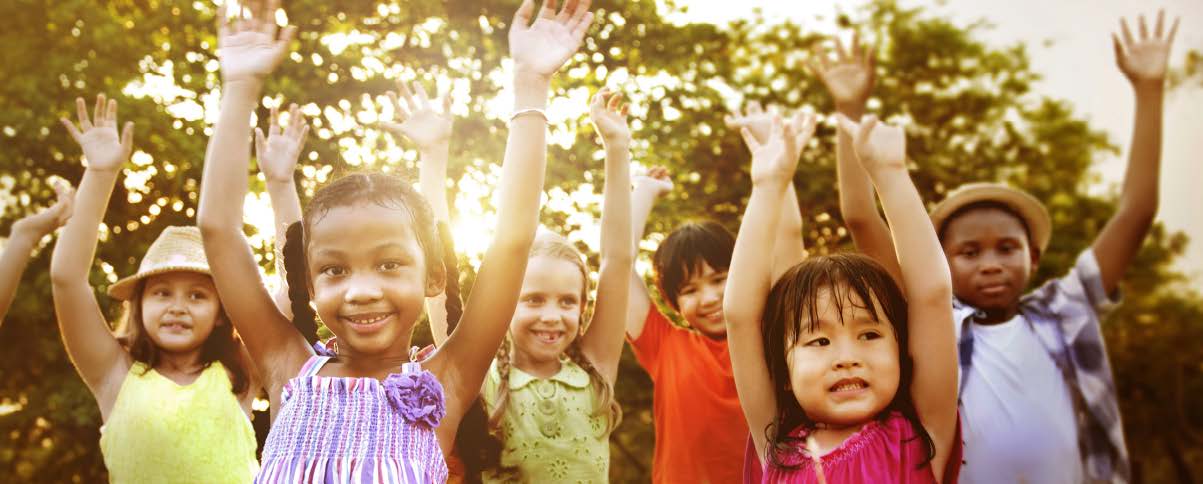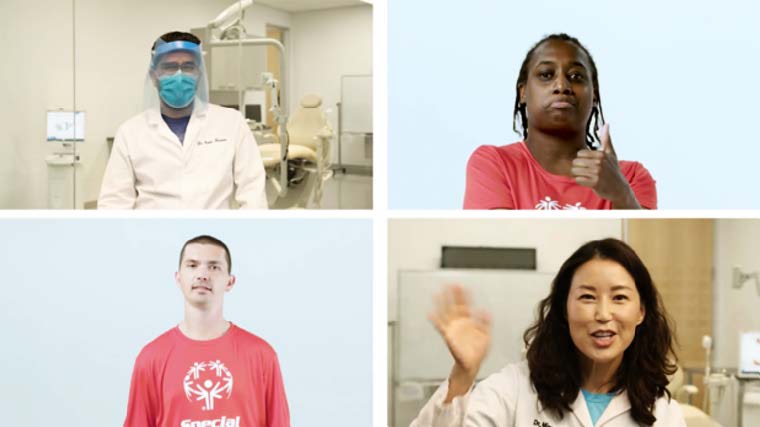WHAT'S HAPPENING
AN UPDATE ON AUTISM SPEAKS DIVERSITY, EQUITY, ACCESS AND INCLUSION (DEAI) EFFORTS
As an organization, Autism Speaks is working to achieve its vision of a world where all people with autism can reach their full potential, including those in minority communities who face greater disparities.
With this in mind, Autism Speaks recently shared an update on their diversity, equity, access and inclusion (DEAI) efforts. Recognizing that this important work will take time, Autism Speaks continues efforts already underway, while identifying new ways to sharpen their focus on the specific needs of people with autism in Black and other communities of color:

REACHING HIGHER: In partnership with Autism Speaks, The Autism Intervention Research Network on Physical Health (AIR-P) aims to increase the evidence base for effective interventions and treatments, develop clinical guidelines and reduce inequalities in ASD care. It also seeks to accelerate the speed at which effective interventions and guidelines are adopted into clinical practice settings.
• Engaging partners & peers: Autism Speaks is committed to engaging, convening and supporting other organizations and families in the community in order to expand the impact of our mission, coordinate resources and advocate for priorities in the Black autism community. We also engage with the autism research community to shape research priorities, such as through our 2019 Thought Leadership Summit on Health Equity ( autismspeaks.org/science-news/advocates-and-researchers-discuss- solutions-reduce-autism-health-care-disparities) featuring keynote remarks ( facebook.com/watch/?v=569044620594281) by the co-chair and cofounder of the Congressional Caucus on Black Women and Girls, Rep. Bonnie Watson Coleman (D-NJ).This summit addressed barriers such as systemic racism and environmental justice. We are committed to continuing engagements like these to advocate with and for the Black autism community.
• Advocating with and alongside the community: Across the U.S, we advocate at the state level for expanded Medicaid coverage of services for children with autism which has provided access to care for individuals of all ethnicities and has had a meaningful impact on communities of color. We inform and engage Congress on inequities in autism healthcare for minority and other underserved groups and hosted a 2019 Congressional briefing ( autismspeaks.org/advocacy-news/autism-disparities-addressing-needs- underserved-communities) on the topic. We advocated for the expansion of federal autism research investment in projects serving the needs of underserved groups in the Autism CARES Act of 2019. Advocacy efforts at the grassroots, state and federal levels will remain central to the organization now and well into the future.
• Ensuring access to early screening and supports: Since 2007, we have worked with the Ad Council to lower the age of diagnosis, with a focus on underserved populations. We are starting to see the results of this work based upon the latest CDC findings ( autismspeaks.org/press-release/cdc-estimate-autism-prevalence-increases-nearly-10-percent-1-54-children-us) , which show the gap in age of diagnosis between Black and white children has started to close, but we also recognize there is more work to be done to further improve timely access to supports and services once a child has been diagnosed. Through our work with the Ad Council and other partners, we remain focused on continuing to close this gap through public service campaigns, education and outreach.
• Providing quality care through the Autism Treatment Network: In partnership with the Autism Intervention Research Network on Physical Health, we devote at least half of all activities in the Autism Speaks Autism Treatment Network to improving autism care for underserved groups. We recently released three new videos and five one-page tip sheets from some of the most used tool kits in our resources to help make these resources more widely available.
• Activating local communities through outreach: Being active in local communities is important to Autism Speaks. Our Outreach and community events bring together young adults and adults with autism, families, local groups and businesses and service providers from diverse backgrounds to share resources, examine needs, explore opportunities and connect with available resources and expertise. We also engage the community through online resources including: tool kits ( autismspeaks.org/autism-speaks-tool-kits) and guides to help people with autism and their families with a variety of topics; Blue Blessings ( autismspeaks.org/blueblessings), a guidebook for faith-based organizations to create more inclusive environments for people with autism; and webinars that cover a wide range of topics. Further, we provide a platform for autistic people to share their stories through our website, social channels and outreach efforts to highlight the diversity of experiences within the community. Anyone who would like to share their story is invited to reach out to us through social media or to send an email to connectwithus@autismspeaks.org.
• Action to engage and educate law enforcement: Nationally, individuals with autism spectrum disorder (ASD) are seven times more likely to interact with law enforcement officers than their peers without disabilities. We have partnered with Dr. Lindsay Shea of Drexel University, who is leading the development of a policy brief devoted to the criminal justice system and the treatment of people with autism. Members of the Autism Speaks services and support team have served on this committee leading this effort for the past year, and the resulting policy brief will be shared publicly in the year ahead. We know that the brief will have significant impact for our community."
Finally, as part of Autism Speaks' ongoing DEAI efforts, their aim is to find and implement meaningful solutions to help people with autism and their families feel safe and supported in their communities. Autism Speaks is working with minorityowned diversity consultancy Nonprofit HR ( nonprof ithr.com/to help guide the next steps. By reviewing internal and external data about their work to date, they are looking to shape a targeted strategy to inform their work in the future. Autism Speaks welcomes an ongoing dialogue. Please reach via ConnectWithUs@autismspeaks.org. For information on how you can advocate for the diverse autism community, visit autismspeaks.org/advocate.
ABOUT AUTISM SPEAKS
Autism Speaks is dedicated to promoting solutions, across the spectrum and throughout the life span, for the needs of individuals with autism and their families. Autism Speaks does this through advocacy and support; increasing understanding and acceptance of people with autism; and advancing research into causes and better interventions for autism spectrum disorder and related conditions. Through partnerships and collaboration, Autism Speaks is committed to increasing global understanding & acceptance of people with autism; being a catalyst for life-enhancing research breakthroughs; increasing early childhood screening & timely interventions; improving the transition to adulthood and ensuring access to reliable information & services throughout the life span Learn more at autismspeaks.org
BRUSH UP ON YOUR DENTAL CARE ROUTINE
On average, four out of every ten athletes with intellectual disabilities on a Special Olympics team are experiencing untreated tooth decay, and one to two of them need urgent dental care. Significant challenges in accessing quality health care and a lack of accessible materials result in pronounced health disparities among people with intellectual disabilities.

ON YOUR MARK, GET SET, BRUSH!: Special Olympics athletes Novie Craven and Justin Hunsinger are joined by Dr. Ho and Dr. Navarro from The Smile Generation® to encourage good oral health and teach proper brushing, flossing, and oral hygiene techniques. When left untreated, oral disease can be painful and expensive to treat.
Special Olympics has been documenting these disparities for more than 20 years through its Healthy Athletes Special Smiles health screenings.
Special Olympics athletes Novie Craven and Justin Hunsinger partnered with a group of dentists from The Smile Generation® to create a set of educational materials for people with intellectual disabilities. These include a Caregiver's Guide to Good Oral Health and a fun "how to" video. Their focus was to make sure these materials are easy to understand, share, and put into practice by people of all abilities: specialolympics.org/oral-health
"As Special Olympics athletes, we want to make sure we do everything to keep our bodies healthy, including our smiles," shares Novie Craven, a Special Olympics athlete from Washington, DC.
Novie and Justin looked to Smile Generation-trusted dentists Dr. Isaac Navarro and Dr. Miran Ho for help with their questions about preparing for a dental visit, flossing, adapting toothbrushes, COVID-19 safety and more. Dr. Ho explains: "Having a healthy mouth allows you to eat, speak, sleep well, be alert and compete. Everything from your brain, to your heart, to your feet is impacted by oral health. Every time you breathe, whatever is in your mouth, goes into your body."
With World Oral Health Day ( worldoralhealthday.org) celebrated on March 20, now is the perfect time to encourage everyone in your life to 'brush up' on their dental care routine. A healthy smile is an important part of your overall health. •
Visit specialolympics.org/oral-health and smilegeneration.com/education/mouth-body-connection to access a range of interactive resources.